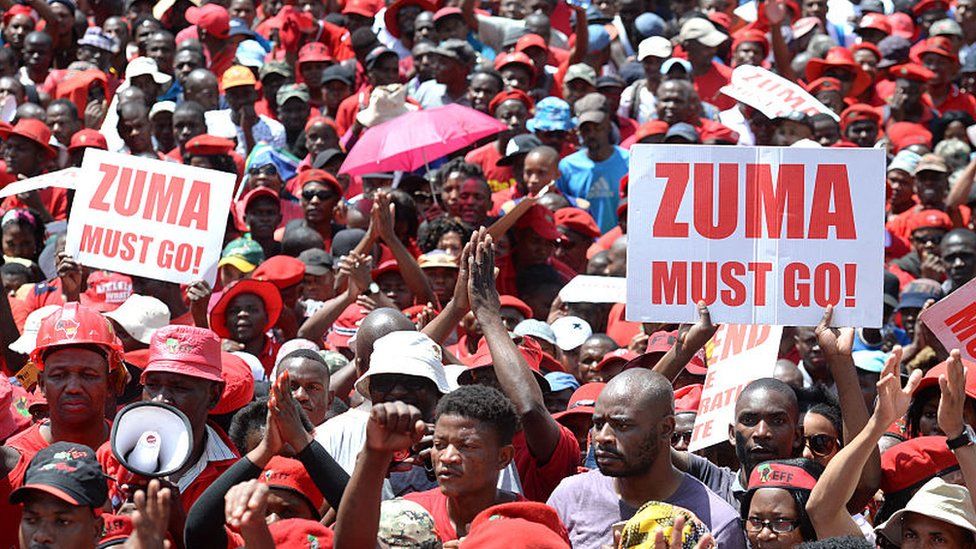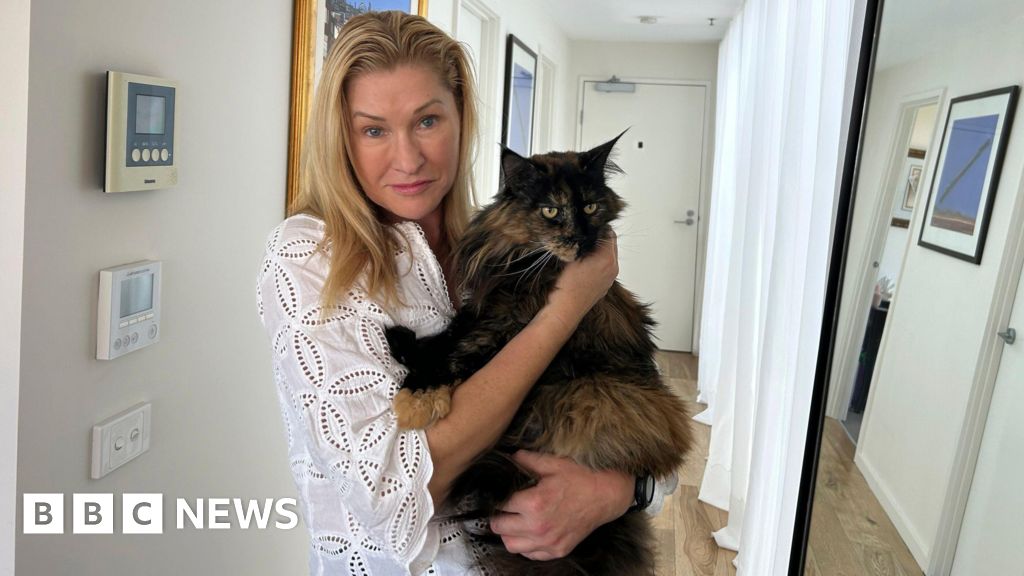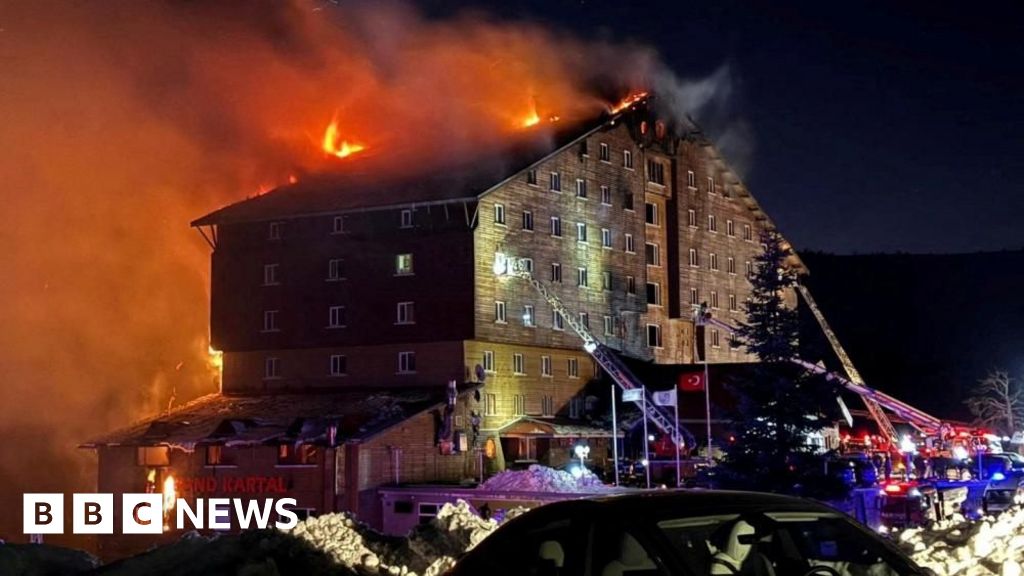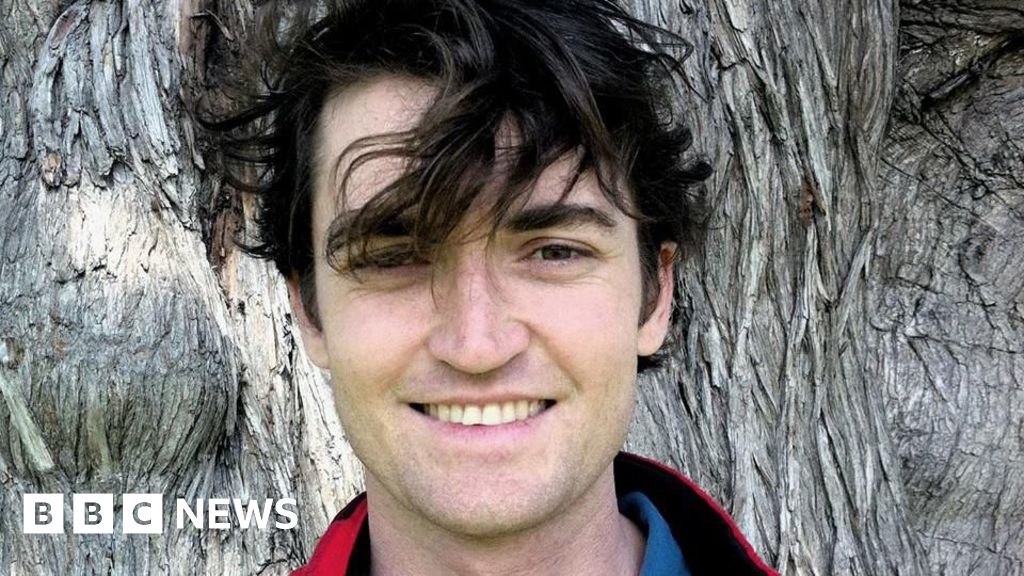ARTICLE AD BOX
By Nomsa Maseko
BBC News, Johannesburg
 Image source, Getty Images
Image source, Getty Images
An initial report into corruption under President Jacob Zuma in 2016 led to large demonstrations calling for him to resign
After the damning findings of an inquiry laid bare the looting of billions of dollars from South Africa's state coffers under his predecessor, President Cyril Ramaphosa vowed it should "never [be] allowed to happen again".
But South Africans are not so sure that lessons will be learnt.
They are angry that the stolen money should have been spent on supporting the country's beleaguered health service and education system.
The mammoth inquiry into corruption during the presidency of Jacob Zuma revealed how almost every arm of the state was suffocated and left bankrupt by leaders of the African National Congress (ANC), which has governed the country since the end of white-minority rule in 1994.
The report is a massive indictment of the party. President Ramaphosa himself was in the firing line with the judge-led panel stating that he should have done more to prevent the graft while he was Zuma's deputy.
Over 5,000 pages, the Zondo commission - named after its chairperson Chief Justice Raymond Zondo - goes into forensic detail about the way state resources were plundered.
It also shows how the wealthy businessmen, the Gupta brothers, tried to influence political and economic decisions in a process known as "state capture".
Zuma was ousted in February 2018 under the cloud of mounting corruption allegations and Mr Ramaphosa, took over, pledging a clean-up.
The final volumes of the report that resulted from the Zondo commission were handed over on Wednesday. The president described what was found as "an assault on our democracy, [violating] the rights of all South Africans".
But part of the report's conclusions leaves the current president with questions to answer about why he stood by.
"There was surely enough credible information in the public domain... to at least prompt him to inquire and perhaps act on a number of serious allegations.
"As the Deputy President, he surely had the responsibility to do so," the report said.
Image source, EPA
Image caption,Chief Justice Raymond Zondo (L) handed the final volumes of his report to President Cyril Ramaphosa on Wednesday
Initially slated to take place over 180 days, the hearings stretched to more than 400 days during which more than 300 witnesses testified. The whole process took nearly four years.
The evidence revealed how ANC leaders, including former and current government ministers, allegedly participated or encouraged looting at a massive cost to the country.
This included crippling the country's revenue service, bringing the national carrier South African Airways to its knees, looting the agency that runs the country's passenger railways, and interfering with the public broadcaster, the SABC.
The secret service was also weakened through the appointment of senior spies who prevented investigations from taking place at the behest of Zuma and others who were seen as close to him.
"The blurring of lines between the ANC and the state was laid bare, party interests were prioritised, crucial government departments were used for the benefit of individuals, resulting in manipulation and political influences," said South African political analyst Dr Mcebisi Mdletyana.
In a damaging finding made by Judge Zondo, this is further clarified. "The ANC under Zuma permitted, supported and enabled corruption."
To try and cushion the blow to the governing party's tainted reputation, the ANC released a statement, expressing its appreciation to the commission for the work done and said it would engage with its findings and "take steps to address these".
South Africans started to see the glaring signs of top-level corruption as well as the culture of undue influence and impunity in 2013. This was when Zuma allowed the Gupta brothers and their guests to land a commercial plane at a military base to attend a wedding.
This was a clear breach of national security. Questions began to be asked about how it could have happened and how much influence the Gupta family had over the state.
Other revelations followed and in 2016, South Africa's Public Protector Thuli Madonsela released a report that detailed the connections between the Guptas and the government. She recommended the setting up of a judicial commission.
The commission, which began its work in 2018, heard how the Gupta brothers - Ajay, Rajesh and Atul - allegedly orchestrated widespread corruption with Zuma's help.
They deny any wrongdoing.
Image source, South African government
Image caption,Atul Gupta (L) seen here with then-President Jacob Zuma in 2011
The commission showed how Zuma's son, Duduzane, was the "conduit between the Guptas and government and took part in awarding government contracts to Gupta-linked companies".
Duduzane Zuma maintains his innocence.
The report also revealed how Zuma colluded with the country's former spy chief Arthur Fraser to halt an investigation into the Gupta family in 2011, paving the way for the emptying of the government purse.
The South African authorities are currently working on having the Gupta brothers extradited from the UAE to answer for their alleged crimes. They were arrested earlier this month in Dubai following an Interpol red notice.
But others, including some of the ANC's most powerful officials, should also face charges of corruption, fraud and money laundering, according to the Zondo commission.
President Ramaphosa said the recommendations made by the commission will be implemented at the appropriate time.
When asked if action would be taken against members of his cabinet who have been implicated, he says he will "form a view within four months" and plans would then be presented to parliament.
The test is whether there will be action.
"If South Africa is serious about fighting corruption… those who've been implicated [will be] criminally charged and successfully prosecuted, [then] a good enough firewall in the fight against corruption would've been put in place," said Dr Mdletyana.
But corruption cases are known to drag on for years with many delays and the National Prosecuting Authority will need to be better resourced to do this.
The fact that Zuma is still standing trial for corruption allegations concerning an arms deal made more than two decades ago - long before he became president - shows how long the process can last.
Also, corruption allegations have swirled around the Ramaphosa government, particularly in the way money was spent during the Covid emergency.
Some analysts have compared the Zondo commission to the work of the country's Truth and Reconciliation Commission (TRC), which was set up to investigate the crimes that took place under apartheid.
The hope was that Zondo would draw a line under government corruption, but as with the TRC, there is a fear that the recommendations will not be acted on.
As for the ANC, with less than two years to go until the next general election, the once glorious and trusted former liberation movement is at risk of losing massive support.
Furthermore, the proposal by Judge Zondo that election rules be amended to allow for South Africans to directly elect a president instead of using the party system could be devastating for the party which has been in power since 1994.
His findings have pushed South Africans to ask if an ANC-backed president can be trusted to uphold his oath of office and put the country first.

 2 years ago
70
2 years ago
70








 English (US) ·
English (US) ·